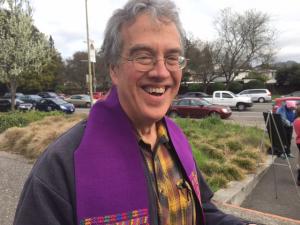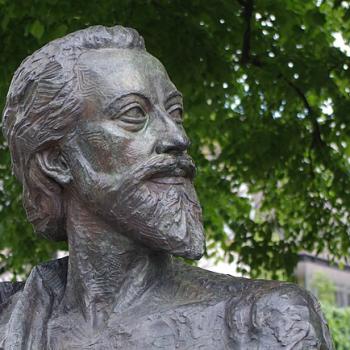As Jesus was greeted by crowds of people, he climbed a mountain. At the top, he sat down with his disciples and began to teach. Blessing them, he said:
In the barrenness of your longing, you taste heaven’s riches.
There is comfort in your broken heart.
Open to life you are content with who you are and what is, you walk free on life’s path.
In your hunger and thirst, here, in your very desire for righteousness, you are filled.
You will find mercy in your mercy.
When the heart and mind are sound, the world opens to you.
When you are at peace, others benefit, together we journey home.
Scorned and reviled, persecuted, you find strength in God.
Paraphrase of the 5th chapter of Matthew by the Reverend David Parks-Ramage
When my grandmother died, for complex reasons, including the fact that her church had a brand new minister, I was asked to deliver her eulogy. It was the first time I’d been inside a Baptist church in several decades. It was also the last time I’ve been in a Baptist church since.
There was, however, a sense of home inside that small rundown building. I recognized the plain, not precisely ugly interior with colored plastic pasted on the windows giving a stained-glass effect—at least if you squinted—and stood at a cheap lectern facing people sitting in metal folding chairs. There was a vague sense of home to it all that was confirmed for me with the first hymn, which cascaded echoes of memory all around me. As I proceeded, I felt the energy from the “amen corner,” mostly murmurs, but occasionally a full on “amen” when I spoke of my grandmother as a prayer warrior, who lived her faith day and night.
I learned my bone and marrow commitment to the spiritual life in little Baptist churches just like that church. And I continue that full-on engagement. I continue to have a sense of connection to the Christian communion, if somewhat tenuous. I am after all a Soto Zen Buddhist priest. And, I am most clearly defined within the frame of Zen, if with a modernist and rationalist streak.
But, I’m also very much aware of the Christian Zen stream. And, I know if a couple of things went a couple of different ways, I could have been counted in that crowd.
I find the mess that is sometimes called Christian Zen a compelling discipline. It’s practitioners are frequently criticised by both Christians and Buddhists – which somehow I find attractive. I deeply respect many Christian Zen teachers, count one of them, Roshi Ruben Habito among my personal guides on the great way, and follow the currents of this community writ large with great interest.
Their approaches are as multiple as the numbers who follow this way. Some are clearly Christians who’ve adapted Zen Buddhist practices to their own purposes. Blessings on them. Some seem simply Zen Buddhists to me, who for complex reasons are unwilling or unable to separate from their Christian connections. Blessings on them. And, then there is a third grouping, people who can walk comfortably among their Christian sisters and brothers, and just as easily walk among their Buddhist sisters and brothers. Theirs is a way between, I guess, now Buddhist, now Christian, tangled by neither, freed by both. Blessings on them.
Among my favorites of these Christian Zen teachers toiling in that difficult but rich field is the Reverend David Parks-Ramage.
David served as a United Church of Christ minister for some thirty years, recently retiring as pastor of the First Congregational Church, UCC, in Santa Rosa, California. He is also a long time student of Zen, has completed the Harada Yasutani Soto Zen reformed koan curriculum, and has been designated a sensei, or teacher, within the Pacific Zen Institute. This means we’re dharma siblings.
I hesitate to name David Christian or Buddhist. He’s fluent in both languages. I guess I’d put him in that third category. What he is, is a competent guide through the thicket of our lives, someone who can point sure, and be of use.
David has recently returned to his native Kentucky where he is starting a sangha, the Panola Ridge Zendo in Waco, Kentucky. I don’t think it is meant to be specifically Christian Zen, but rather offers an interfaith approach while being faithful to the transmission of shikantaza and formal koan introspection. If you’re in the area, not a bad place to find a forming sangha and an authentic guide on the ways of heart and mind.
And at no extra charge a few words from the late Father Thomas Hand on walking the Zen Christian path…













